Home | Category: Medieval Period / Abbasids / Abbasids
HARUN AL-RASHID
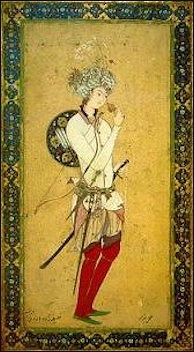
Harun Al-Rashid in the "World of The Thousand and One Nights"
Harun al-Rashid (ruled 786-809) is the most famous of the Abbasid Caliphs. A contemporary of Charlemagne and perhaps the greatest ruler of the Arab world, he oversaw the Golden Age of Islamic culture as the Muslims made progress militarily against the Byzantines and nearly captured Constantinople. Harun al-Rashid helped established a unified Muslim law for the entire Muslim world. He ruthlessly crushed any opposition groups and this helped usher in a period of peace.
Harun al-Rashid was a far cry from the first caliphs, who lived humbly in rather modest homes and required that Muslim only prostrate themselves before God. Harun al-Rashid ruled like a classic grand monarch. He made his home in huge palaces and required courtiers to kiss the ground when they were in his presence. He was called the “Shadow of God on Earth” and was often accompanied by an executioner to show that he had the power of life and death. Much of the day to day duties of running the empire was left to his vizier. The military was dominated by Persians.
Under Harun the arts and music flourished; the "Arabian Nights" stories were collected and written down; mathematics, sciences and medicine were pursued; and the elite at least enjoyed themselves and the arts. Abu Nuwas, a poet friend of Harun al-Rashid, wrote: "How can you but enjoy yourself/ When the world is in blossom,/ And wine is at hand?"
Harun was a poet, scholar and patron of literature. He also liked traveling among his subjects in a disguise. When the stories of "Arabian Nights" were introduced to the court many storytellers flattered him by making him a central character of many of the stories, often as a ruler traveling in disguises among his subjects.
Harun's son and main successor Al-Ma'mun founded the "House of Wisdom," an academy dedicated to translating Roman and Greek texts and works of science and philosophy into Arabic.
Websites on Islamic History: History of Islam: An encyclopedia of Islamic history historyofislam.com ; Oxford Encyclopedia of the Islamic World oxfordislamicstudies.com ; Sacred Footsetps sacredfootsteps.com ; Islamic History Resources uga.edu/islam/history ; Internet Islamic History Sourcebook fordham.edu/halsall/islam/islamsbook ; Islamic History friesian.com/islam ; Muslim Heritage muslimheritage.com ; Chronological history of Islam barkati.net
RECOMMENDED BOOKS:
“Harun Al-Rashid and the World of a Thousand and One Nights” by Andre Clot and John Howe Amazon.com ;
“The Great Caliphs: The Golden Age of the 'Abbasid Empire” by Amira K. Bennison Amazon.com ;
“The Abbasid Caliphate” by Tayeb El-Hibri Amazon.com ;
“Caliphate: The History of an Idea” by Hugh Kennedy Amazon.com ;
“Baghdad During the Abbasid Caliphate” by G Le Strange Amazon.com ;
“The House of Wisdom: How Arabic Science Saved Ancient Knowledge and Gave Us the Renaissance” by Jim Al-Khalili, Simon Vance, et al. Amazon.com ;
“1001 Inventions: The Enduring Legacy of Muslim Civilization: Official Companion to the 1001 Inventions Exhibition” by Salim T.S. Al-Hassani Amazon.com ;
“Pathfinders: The Golden Age Of Arabic Science” by Jim Al-Khalili Amazon.com ;
“The Arabian Nights: Tales of 1,001 Nights: Volume 1" (Penguin Classics) Amazon.com ;
“The Arabs: A History” by Eugene Rogan Amazon.com ;
“The New Cambridge History of Islam: Volume 1, Formation of the Islamic World, 6th to 11th Centuries Amazon.com ;
“Arabs: A 3,000-Year History of Peoples, Tribes, and Empires” by Tim Mackintosh-Smith, Ralph Lister, et al. Amazon.com ;
“The Arabs in History” by Bernard Lewis Amazon.com ;
“History of Islam” (3 Volumes) by Akbar Shah Najeebabadi and Abdul Rahman Abdullah Amazon.com
Al-Masu'di on Harun Al Rashid
Abul Hasan Ali Al-Masu'di wrote: “Harun Al Rashid became Caliph in the year A.D. 786, and he ranks among the Caliphs who have been most distinguished by eloquence, learning, and generosity. During the whole of his reign he performed the pilgrimage to Mecca or carried on war with the unbelievers nearly every year. His daily prayers exceeded the number fixed by the law, and he used to perform the pilgrimage on foot, an act which no previous Caliph had done. When he went on pilgrimage he took with him a hundred learned men and their sons, and when he did not perform it himself he sent three hundred substitutes, whom he appareled richly, and whose expenses he defrayed with generosity. [Source: The Book of Golden Meadows, c. 940 CE , Charles F. Horne, ed., “The Sacred Books and Early Literature of the East,” (New York: Parke, Austin, & Lipscomb, 1917), Vol. VI: Medieval Arabia, pp. 35-89, Internet Islamic History Sourcebook, sourcebooks.fordham.edu]
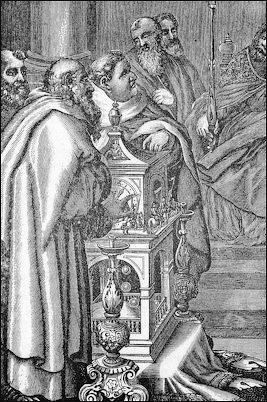
Illustration showing Harun al-Rashid giving a water clock to Charlemagne
“His conduct generally resembled that of the Caliph Mansur, but he did not imitate the parsimony of the latter. He always repaid services done to him, and that without much delay. He was fond of poetry and poets, and patronized literary and learned men. Religious controversies were hateful to him. Eulogy he relished highly, especially eulogy by gifted poets, whom he richly rewarded.
“The historian Asmai relates the following anecdote: One day the Caliph gave a feast in a magnificently decorated hall. During the feast he sent for the poet Abu'l Atahiyah, and commanded him to depict in verse the gorgeous scene. The poet began: "Live, O Caliph, in the fulfilment of all thy desire, in the shelter of thy lofty palace!" "Very good!" exclaimed Rashid. "Let us hear the rest."
“The poet continued: "Each morn and eve be all thy servitors swift to execute thy behests!" "Excellent!" said the Caliph. "Go on!" The poet replied: "But when the death-rattle chokes thy breath thou wilt learn, alas! that all thy delights were a shadow." Rashid burst into tears. Fadhl, the son of Yahya (Harun's Vizier), seeing this, said to the poet: "The Caliph sent for you to divert him, and you have plunged him into melancholy." "Let him be," said Rashid; "he saw us in a state of blindness, and tried to open our eyes."
“This Prince treated learned men with great regard. Abou Moawia, one of the most learned men of his time, related that when he was sitting one day at food with the Caliph, the latter poured water on his hands after the meal, and said to him: "Abou Moawia, do you know who has just washed your hands?" He answered: "No." Rashid informed him that it was himself. Abou Moawia replied: "Prince, you doubtless act in this manner in order to do homage to learning." "You speak truth," answered Rashid.
Harun Al Rashid and the Musicians
Abul Hasan Ali Al-Masu'di wrote: “Ibrahim Mouseli relates the following story: "Rashid one day summoned all his musicians. I and Meskin of Medina were among the performers. Rashid had partaken freely of wine, and wished to hear performed an air which had suddenly occurred to his mind. The officer stationed before the curtain which concealed the Caliph told Ibn Tami to sing this piece. The latter obeyed, but did not succeed in pleasing the Caliph. Each of the singers present attempted it, but were no more successful than Ibn Jami. Then the officer, addressing Meskin, said: 'The Commander of the Faithful orders you to sing this air if you can do it properly.' [Source: The Book of Golden Meadows, c. 940 CE , Charles F. Horne, ed., “The Sacred Books and Early Literature of the East,” (New York: Parke, Austin, & Lipscomb, 1917), Vol. VI: Medieval Arabia, pp. 35-89, Internet Islamic History Sourcebook, sourcebooks.fordham.edu]
“"Meskin commenced at once to sing, to the great surprise of the audience, who could not understand how a musician like him had the courage to attempt before us an air which none of us had been able to render to the satisfaction of the Caliph. As soon as he had finished I heard Rashid raise his voice and ask to hear it a second time. Meskin recommenced with a skill and spirit which won him everybody's applause. The Caliph congratulated and praised him to the skies; then he had the curtain behind which he had been sitting drawn aside.
“"'Prince of the believers,' then said Meskin to him, 'a strange story attaches to this piece'; and at the invitation of the Caliph he narrated it in these words: 'I was formerly a slave of a member of the family of Zobeir, and carried on the trade of a tailor. My master claimed from me a tax of two dirhems daily, after paying which I was free to do what I liked. I was passionately fond of singing. One day a descendant of ali, for whom I had just completed a tunic, paid me two dirhems for it, kept me to eat with him, and made me drink generously. As I left him I met a negress carrying her pitcher on her shoulder, and singing the song you have just heard. I was so delighted at it that, forgetting everything else, I said to her: "By the Prophet, I adjure thee to teach me that air." "By the Prophet," she answered, "I will not teach it unless you pay me two dirhems."
“"'Then, Prince of believers, I took out the two dirhems, with which I had intended to pay my daily tax, and gave them to the negress. She, setting her pitcher down, sat on the ground and, keeping time with her fingers on the pitcher, sang the piece, and repeated it till it was well impressed on my memory. I then proceeded to my master. As soon as he saw me he demanded his two dirhems, and I related my adventure to him. "Scoundrel!" he said. "Have I not warned you that I will take no excuse, even if a farthing is missing?" Saying this, he laid me on the ground and, with the utmost vigor of his arm, gave me fifty strokes of a rod, and, as an additional disgrace, caused my head and chin to be shaved. Verily, O Prince, I passed a melancholy night. The severe punishment I had undergone made me forget the piece I had learned, and this was the saddest of all. In the morning, wrapping my head in a cloak, I hid my large tailor's scissors in my sleeve, and directed my steps to the spot where I had met the negress. I waited there in perplexity, not knowing her name nor her abode. all at once I saw her coming; the sight of her dispersed all my cares. I approached her, and she said to me: "By the Lord of the Kaaba, you have forgotten the song!" "Yes, I have," I answered. I told her how my head and chin had been shaved, and offered her a reward if she would sing her song again. "By the Prophet," she answered, "I will not for less than two dirhems."
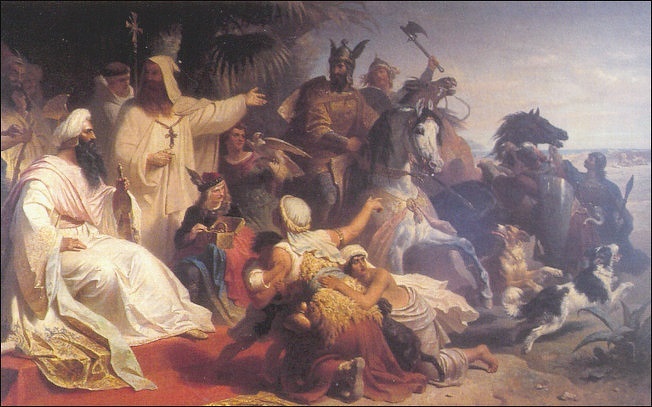
Harun and Charlemagne
“"'I took out my scissors and ran and pawned them for two dirhems, which I gave her. She put down her pitcher, and began to sing as she had done the evening before; but as soon as she began, I said: "Give me back the two dirhems; I don't need your song." "By allah," she said, "you shall not see them again; don't think it." Then she added: "I am certain that the four dirhems you have spent will be worth to you four thousand dinars from the hand of the Caliph." Then she resumed her song, accompanying herself, as before, on her pitcher, and did not cease repeating it till I had got it by heart.
“"'We separated. I returned to my master, but in a state of great apprehension. When he saw me he demanded his daily due, while I stammered out excuses. "Beast!" he shouted, "was not yesterday's lesson enough for you?" "I wish to speak to you frankly and without falsehood," I answered. "Yesterday's and today's dirhems went in payment for a song"; and I began to sing it to him. "What!" he exclaimed, "you have known an air like that for two days and told me nothing of it? May my wife be divorced if it is not true that I would have let you go yesterday if you had sung it to me! Your head and chin have been shaved—I can not help that—but I let you off your tax till your hair grows again.'"
“"Hearing this recital, Rashid laughed heartily, and said to the musician: 'I don't know which is better, your song or your story; I will see in my turn that the forecast of the negress is verified.' So Meskin went out from the Caliph's presence richer by four thousand dinars."
Barmecides, Viziers of Harun Al Rashid
Abul Hasan Ali Al-Masu'di wrote: “On attaining the Caliphate, Rashid conferred the Viziership on Yahya, son of Khaled, son of Barmec. Yahya had served him as secretary before his accession to the throne, and this was the foundation of the magnificence of the family of the Barmecides, whose commencement and whose tragic fall we are about to narrate. [Source: The Book of Golden Meadows, c. 940 CE , Charles F. Horne, ed., “The Sacred Books and Early Literature of the East,” (New York: Parke, Austin, & Lipscomb, 1917), Vol. VI: Medieval Arabia, pp. 35-89, Internet Islamic History Sourcebook, sourcebooks.fordham.edu]
“The family of the Barmecides had originally been Zarathustrians in religion, but from the time of their embracing Islam they continued to be good Muslims. They were the crown and ornament of their age. Their generosity passed into a proverb; adherents thronged to their court from every side, and multitudes centered their hopes on them. Fortune showered upon them a prodigality of favors. Yahya and his sons were like brilliant stars, vast oceans, impetuous torrents, beneficent showers. Every kind of talent and learning was represented in their court, and men of worth received a hearty welcome there. The world was revived under their administration, and the empire reached its culminating point of splendor. They were a refuge for the afflicted and a haven for the distressed. The poet Abou-Nowas said of them: "Since the world has lost you, O sons of Barmec, we no longer see the ways crowded with travelers at sunrise and sunset."
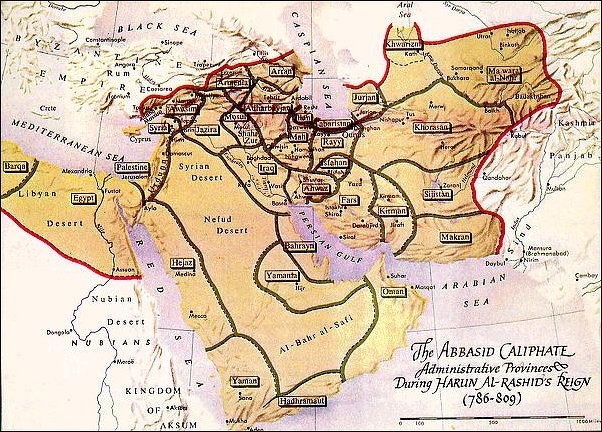
Generosity of the Barmecides
Abul Hasan Ali Al-Masu'di wrote: “We have an example of the generosity of the Barmecides in the following story, related by Salih bin Muhran, one of the intimate attendants of Harun Al Rashid: "One day Harun sent for me, and when I arrived in his presence I saw that he was vexed and perplexed, and full of thought, and very much enraged. When I stood still awhile he lifted up his head, and said: 'Go this moment to Mansur Bin Ziyad, and before night thou must have from him ten thousand thousand dirhems, and, if not, cut off his head and bring it to me; and if thou fail in this, I swear by the soul of Madhi I will command thy head to be severed from thy body.' I said: 'May the life of the Commander of the Faithful be prolonged! If he gives a part today, and sends somewhat more tomorrow on the condition that he gives me a pledge for the payment of the whole—' He replied: 'No! If he does not give thee today ten thousand thousand dirhems in coined money, bring me his head. What concern hast thou in this matter?' When he said this I knew he was aiming at the life of Mansur, and I went out from him in great perplexity and distress, saying, 'O Lord, what has come to me? It will be needful to slay Mansur, and he is one of the most worthy and best-known men of Baghdad, and has a numerous following.' [Source: The Book of Golden Meadows, c. 940 CE , Charles F. Horne, ed., “The Sacred Books and Early Literature of the East,” (New York: Parke, Austin, & Lipscomb, 1917), Vol. VI: Medieval Arabia, pp. 35-89, Internet Islamic History Sourcebook, sourcebooks.fordham.edu]
“"At length I went to the house of Mansur, and, taking him on one side, told him the whole story as it had happened, and what my commands were. When he heard he wept aloud, and fell at my feet, saying: 'In truth the Commander of the Faithful seeks my life; for his courtiers and many others know there is no such sum in my house. Nor could I in my whole life bring together so much; how, then, can I do it in one day? But do thou show me one favor, for God's sake: take me to my house, that I may bid farewell to my children and followers and clansmen, and ask forgiveness of my offenses from my companions and acquaintances.'
“"I took him to his house, as he desired, and when his family and chief friends heard what had happened there was an outcry among them. They wept and bewailed so that jinns and men, and wild beasts and birds, were sorrowful for them, and my heart burned to see them. At last he brought out what money and valuables he had, amounting to two million dirhems, and gave it to me, saying: 'In days past, before Harun Al Rashid was Caliph, I often vexed Yahya the Barmecide, and during this present reign also he suffered much annoyance and persecution from me. But on a certain occasion he treated me with kindness, and put my hand in his, and I knew that he had forgiven my fault, and that there was no feeling of revenge remaining in his heart; and afterward he did me many kindnesses with the Caliph. If thou wilt deal kindly with me—his house is at the head of the way—take me there. It may be his heart will be touched for me; for all the members of his house are men of liberality and they desire that even their enemy and ill-wisher may take refuge with them, that they may help him in his distress and misery.'
“"I said: 'Thou speakest truly, and it will be a delight to myself to take thee there. Come, let us go. By allah the Most High, it must needs be they will cause thee to rejoice.' When we arrived at the house of Yahya, he had just finished the afternoon prayer, and was repeating the Tesbih. When he saw Mansur, and he had explained to him his distress and misery, Yahya came up to me and inquired of me the state of the case, which I revealed to him. He comforted Mansur, and bade him keep up his heart; 'For,' said he, 'I will not be wanting in doing all that is in my power to help thee.' At the same time he called his treasurer, and said to him: 'Bring me all that is in the treasury.' The treasurer brought all that he had of coined money and jewels, and the amount was two hundred thousand dirhems.
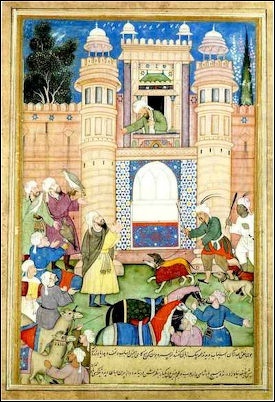
“"Then he wrote a letter to his eldest son, Fadhl, bidding him send what money he had, for that an unfortunate man was waiting for it. When Fadhl had read the note, he immediately sent two hundred thousand dirhems. Then he wrote a note to Jafar, his younger son, bidding him send immediately all the money he had. He also sent three hundred thousand dirhems. Then he said to me: 'Take this money to the Commander of the Faithful, and represent to him that I will send tomorrow three million dirhems more into his treasury.' I replied: 'This is not in my orders. Today, by the hour of evening prayer, I must be in the presence of the Caliph with the gold or the head.'
“"When Yahya heard this he sent for his slave Otbah, and bade her go to Fatima, the sister of the Commander of the Faithful, and to explain the case to her. When Otbah had told Fatima how the matter stood, that lady, who was a woman of much generosity, took off a collar set with jewels which she had received from the Caliph, of which the value was estimated at two hundred thousand dinars of gold, and sent it to Yahya, asking besides a thousand pardons that she could do no more.
“"When at last the ten million of dirhems was raised, Yahya delivered it all to porters, and sent it by me to the Caliph. It was near the setting of the sun when I brought the money to Harun Al Rashid. When he saw me, he cried: 'Hast thou brought Mansur?' I told him all that had passed, whereupon he bade me send the money to the treasury and go for Yahya. When I had placed the money in the treasury, I went to Yahya and told him that the Caliph had accepted the money, and wished to see him. He broke out into exclamations of gladness when he heard this, and, calling for Mansur, he said: 'Take courage, for thou art saved from destruction. The Commander of the Faithful has just asked for me, and I will so contrive as to render him again favorably disposed toward thee.'
“"Then Mansur's soul again returned to his body, and he thanked Yahya fervently. When Yahya arrived in the presence of the Caliph and saw his face averted, he was afraid; for he thought: 'Perchance he will reprove me for my want of respect in releasing Mansur.' So, after some time, he prayed for pardon of his offense, and conciliated the Caliph. Afterward he said: 'Wilt thou tell me what was the crime of which Mansur was guilty?' The Caliph replied: 'His crime was his enmity against you and his evil-speaking concerning you. For this reason I have long wished to strike off his head. Today I was so incensed that I commanded either that he should pay this money or that his head should be cut off. But thou hast done as the generous always do.' Yahya said: 'May the life of the Commander of the Faithful be long! For if the Commander of the Faithful had said, "The wealth of Yahya and his sons is of my gift, and this necklace, too, of my sister's is a gift of mine. What has any one to do in this matter? Go and cut off Mansur's head," what could he have done and what could I have done?'
“"This speech pleased Harun Al Rashid, but he blamed Yahya because he had asked for his sister's necklace, and sent it to the treasury to meet the demand on Mansur. He also blamed his sister for giving away the necklace. She replied: 'It would have been shame if I had not answered the request of one who was in the place of a father to me.' This reply pleased the Caliph, and he restored to Fatima the jeweled collar, and Yahya and Mansur were again glad at heart."
Harun Al Rashid’s Great Affection for Jafar Barmecides
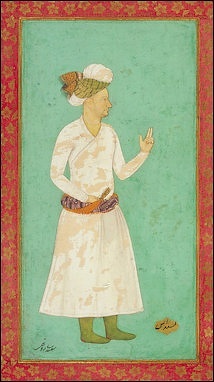
Abul Hasan Ali Al-Masu'di wrote: “Harun Al Rashid had such an extraordinary affection to Jafar the Barmecide that he could not bear to be one hour apart from him. Rashid loved his own sister Abbasah also with an extreme affection, and could not bear to be long absent from her. She was a woman of extraordinary beauty, and exceeded all in science and knowledge. Zobeidah, who was the chief favorite of the Caliph, and all her dependents were opposed to Abbasah. [Source: The Book of Golden Meadows, c. 940 CE , Charles F. Horne, ed., “The Sacred Books and Early Literature of the East,” (New York: Parke, Austin, & Lipscomb, 1917), Vol. VI: Medieval Arabia, pp. 35-89, Internet Islamic History Sourcebook, sourcebooks.fordham.edu]
“One day Rashid said to Jafar: "Thou knowest how great is my affection to thee, and also how greatly I love my sister Abbasah, and that I can not live without the company of either of you. I have thought of an expedient whereby you may both accompany me in the same assembly—that a marriage take place between you. That will legalize your meeting and authorize your beholding one another. But all this is on condition that you never meet except I am a third in the party."
“When Jafar heard this, the world on all sides grew black with darkness to his eyes. Distressed and confounded, he fell at the feet of Rashid, and said: "Commander of the Faithful, wilt thou slay me? From the time of Adam to our day no servant has been admitted to such confidence as that he should marry with the family of his lords and benefactors; or if any one hath treacherously imagined such a thing, very shortly he hath been reduced to nothingness, and all men have counted him a bread-and-salt traitor. And what sin hath thy slave committed, O Commander of the Faithful, that thou shouldest seek after his blood? Is this the reward of all my services and devotion? And, besides, how should I, the son of a Persian fire-worshiper, be allied to the family of Hashem and the nephews of the Prophet—may the mercy of God be upon him and his family!—and by what right can I aspire to such a distinction? If my father and mother heard of this, they would mourn for me, and my enemies would rejoice."
“Some days passed, and he neither ate nor drank, but all was of no avail. He could not oppose the decrees of heaven and the ordainment of God by remedy or contrivance. Unable to help himself, he submitted and consented to a marriage on the terms before mentioned. When Yahya, the father of Jafar and Fadhl, and his other brothers heard of this, they were full of sorrow, and looked for the reversal of their fortune and the downfall of their power.
“These forebodings were soon justified. The cruel commands of Rashid to his favorite and his sister were disregarded, and Abbasah became a mother. The birth of the child, concealed for a time, was revealed to Rashid by a vengeful slave-girl whom Abbasah had struck. The Caliph was intensely wroth, but concealed his indignation for a time, though betraying it at unguarded moments.
“Ahmed Bin Muhammad Wasil, who was one of his confidential attendants, relates as follows: "One day I was standing before Rashid in his private apartment when no one besides was there. Perfumes were burning, and the place was filled with sweet odors. Harun Al Rashid lay down to rest, and wrapped his head in the skirt of his garment to keep his eyes cool, when Jafar the Barmecide came in and told his business to the Caliph, receiving in return a gracious answer, and retiring. In those days the story of Abbasah and her union with Fafar was talked of currently among the people.
“"When Jafar was gone Rashid lifted his head out of his skirt, and from his mouth came these words: 'O God, do thou so favor Jafar the Barmecide that he may kill me, or make me quickly powerful over him that I may cut off his head from his body; for with anger and jealousy against him I am near to destruction.' These words he spoke to himself but they reached my ears, and I trembled within and without, and I said to myself: 'If the Commander of the Faithful knows that I have heard this, he will not leave me alive.'
“"Suddenly Harun Al Rashid lifted up his head from its covering, and said to me: 'Hast thou heard that which I said to myself just now?' I said: 'I have not heard it.' The Commander of the Faithful said: 'There is no one but thyself here, and so truly as the censer is in thy hand, thou hast heard all. If thou care for thy life, keep this secret concealed; and if not, I will strike off thy head.' I replied: 'May the life of the Commander of the Faithful be long! I have not heard any of these words.' And with this the Caliph was satisfied."
Fall of the Barmecides and Death of Harun Al Rashid

Abul Hasan Ali Al-Masu'di wrote:“It was not long after this that the blow fell on the Barmecides. On his return from one of his pilgrimages to Mecca, Rashid came by water from Hira to Anbar, on the River Euphrates. Here he invited the three brothers Fadhl, Jafar, and Mousa, to his presence, and, having caressed them with extraordinary cordiality, dismissed them once more to their quarters, with rich khelats, the customary robe of honor. The Caliph withdrew to his apartments, and betook himself to his usual indulgence in wine. In a little time he sent one of his domestics to inquire if Jafar was employed in the same way. Finding that such was not the case, Rashid sent his attendant again to Jafar, urging him by the life of his master to imitate his example without further delay, for that his wine seemed deprived of all its zest until he knew that his faithful Jafar partook of the same enjoyment. [Source: The Book of Golden Meadows, c. 940 CE , Charles F. Horne, ed., “The Sacred Books and Early Literature of the East,” (New York: Parke, Austin, & Lipscomb, 1917), Vol. VI: Medieval Arabia, pp. 35-89, Internet Islamic History Sourcebook, sourcebooks.fordham.edu]
“Jafar felt, however, unaccountably alarmed and averse to such a gratification, and, reluctantly withdrawing to his chamber, called for the wine. It happened that he was attended by a favorite blind minstrel named Abou Zaccar, to whom, after a few goblets, he could not forbear from communicating his apprehensions. The minstrel treated them as merely imaginary, urged his master to banish them from his thoughts, and to resume his usual cheerfulness. But Jafar declared that he found it impossible to dispel the uneasiness which seemed to haunt him. About the hour of evening prayer another messenger arrived from Rashid with a present of nuts and sweetmeats for Jafar, as a relish to his wine, from his own table.
“When midnight came, Rashid called for Mesrour, his favorite domestic, and directed him to bring Jafar and strike off his head. Mesrour proceeded accordingly, and entering Jafar's apartment while Abou Zaccar was singing some Arabic verses, stood suddenly at the head of Jafar, who started involuntarily at his appearance. Mesrour told him that he was summoned to attend the Caliph. Jafar entreated that he might be permitted to withdraw for a moment, to speak to the women of his family. This last indulgence was withheld, Mesrour observing that any instructions which he had to communicate might as well be delivered where he was. This he was accordingly obliged to do, after which he accompanied Mesrour to his tent, on entering which the latter immediately drew his sword. Jafar asked that the Caliph's instructions might be explained to him, and when he heard them, cautioned Mesrour to beware how he carried into execution an order which had evidently been given under the influence of wine, lest, when their sovereign should be restored to himself, it might be followed by unavailing repentance and remorse. He further adjured Mesrour by the memory of their past friendship that he would return to the Caliph's presence, and require his final commands.
“Mesrour yielded to these entreaties, and appeared before Rashid, whom he found expecting his return. "Is this the head of Jafar?" demanded the Caliph. "Jafar is at the door, my lord," replied Mesrour, with some trepidation. "I wanted not Jafar," said the Caliph sternly; "I wanted his head." This sealed the fate of the unhappy favorite. Mesrour immediately withdrew, decapitated Jafar in the antechamber, and returned with his head, which he laid at the Caliph's feet. He was then directed by Rashid to keep that head by him till he should receive further orders.
“In the meantime he was enjoined to proceed without delay and apprehend Yahya, his three sons, Fadhl, Muhammad, and Mousa, and his brother Muhammad. These commands were immediately carried into execution. The head of Jafar was dispatched the next day, to be suspended to a gibbet on the bridge of Bagdad, after which the Caliph continued his journey to Rakkah.
“Stripped of all their wealth and honors, Yahya, his three sons, and his brother Muhammad, languished in confinement until the former perished in prison. At first they were allowed some liberty, but subsequently they experienced alternatives of rigor and relaxation, according to the reports which reached Rashid concerning them. He then confiscated the property of every member of the family. It is said that Mesrour was sent by him to the prison, and that he told the jailor to bring Fadhl before him. When he was brought out, Mesrour addressed him thus: "The Commander of the Faithful sends me to say that he ordered thee to make a true state ment of thy property, and that thou didst pretend to do so but he is assured that thou hast still great wealth in reserve, and his orders to me are that, if thou dost not inform me where the money is, I am to give thee two hundred strokes of a whip. I should therefore advise thee not to prefer thy riches to thyself." [Source: The Book of Golden Meadows, c. 940 CE , Charles F. Horne, ed., “The Sacred Books and Early Literature of the East,” (New York: Parke, Austin, & Lipscomb, 1917), Vol. VI: Medieval Arabia, pp. 35-89, Internet Islamic History Sourcebook, sourcebooks.fordham.edu]
“Shortly after this Rashid, though suffering from the disease which was to end his life, set out to put down a rebellion in Transoxiana. When one of the captured rebel leaders was brought into his presence, he ordered him to be cut to pieces limb by limb on the spot. When the execution was over Rashid fell into a swoon, and, on recovering himself, asked his physician if he did not recollect the dream which had occurred to him at Rakkah, for they were now in the neighborhood of Tuz. He also desired his chamberlain Mesrour to bring him a sample of the native earth of the country. When Mesrour returned with his naked arm extended, Rashid immediately exclaimed: "Behold the arm and the earth, precisely as they appeared in my dream!" The Caliph died at midnight the following Saturday, March 23, A.D. 809.
For the complete article from which the material here is derived see Medieval Sourcebook: Abul Hasan Ali Al-Masu'di (Masoudi) (ca. 895?-957 CE) The Book of Golden Meadows, c. 940 CEsourcebooks.fordham.edu
Image Sources: Wikimedia Commons
Text Sources: Internet Islamic History Sourcebook: sourcebooks.fordham.edu ; Arab News, Jeddah; “Islam, a Short History” by Karen Armstrong; “A History of the Arab Peoples” by Albert Hourani (Faber and Faber, 1991); Metropolitan Museum of Art, Encyclopedia.com, National Geographic, BBC, New York Times, Washington Post, Los Angeles Times, Smithsonian magazine, The Guardian, Al Jazeera, The New Yorker, Reuters, Associated Press, AFP, Library of Congress and various books and other publications.
Last updated April 2024
